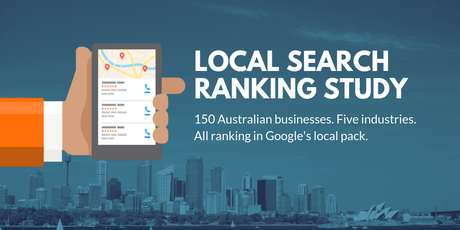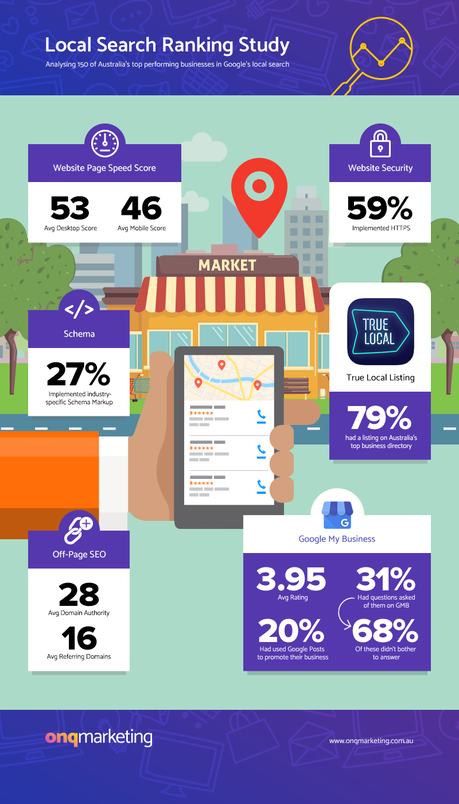
Do you want to know how to rank in Google's local search results?
There is a lot of advice online for you to read. You could start there. Much of it outlining Google's guidelines, analysing the comments made by the team at Google, as well as other 'experts' suggesting what they believe to be Google's ranking factors.
However, often the most valuable advice you'll find, when it comes to SEO is courtesy of studies, and that is what we've done.
We decided to perform our own test and to publish the findings to help you understand what might rank you better.
If you want your Australian business to rank in Google's local pack, read on further and identify where you should focus your efforts.
Our Research Parameters
- Five verticals - Law firms, car dealers, dental clinics, real estate agencies, travel agencies.
- Ten locations - Melbourne, Sydney, Brisbane, Perth, Adelaide, Gold Coast, Newcastle, Geelong, Hobart, Canberra
- Thirteen data points - Referring domains, domain authority, desktop page speed, mobile page speed, HTTPS, key schema type, GMB rating, GMB reviews, GMB posts, GMB questions, GMB answers, GMB landing page and directory listings.
Key Takeaways:
- FlightCentre and Helloworld dominate the travel agency space with 17 of the possible 30 spots.
- Real Estate was the industry with the slowest websites.
- Dentists utilised their specific Schema type more so than other verticals.
- Law Firms had more referring domains than others
- Car Dealerships were less inclined to make the switch to HTTPs.
- Sydney and Canberra ranked their businesses lower than other locations.
- Travel agencies and Car Dealers showed significantly less interest in listing in business directories.
General Tips To Rank in Google's Local Pack
It was a sobering experience, analysing the data to realise so many businesses ranking were far from being optimised. Were Google's guidelines irrelevant? Or was it a result of a more substantial ignorance to optimising for search?
Unfortunately, we can't answer that from our research, however among the 150 businesses some basic benchmarks were demonstrated.
- 27% had implemented their specific Schema type
- 59% had implemented HTTPS - Although many had not updated their URL in GMB.
- 20% had used Google Posts to promote an event or deal with Google's Knowledge Graph.
- 31% had questions asked of them from users within their GMB profile. Unfortunately, of this 68 % of the customer's questions had gone unanswered.
- 79% had a listing on Australia's top business directory - True Local
The data also demonstrated that if you want to be ranking, then you should have:
- Domain Authority of 20+.
- Have 16+ referring domains
- Have a GMB rating of 3.5 or more
- Have more than seven total GMB reviews
- Your desktop page speed score should be above 53 and your mobile score above 46

Local Ranking Takeaways For Law Firms
There were mixed results for law firms. However, in general, they were one of the better performers albeit lacking in a couple of critical areas.
Law firms had the fastest page speed scores on both desktop and mobile, so there is a high benchmark to make sure you meet. It would help if you were aiming for page speed scores of 66+ for desktop and 60+ for mobile.
Another area where law firms scored well was with domain authority and that closely linked to referring domains. So make sure you are using your network to build your backlink profile. It would help if you were aiming to get your DA to above 24 and have a minimum of 42 referring domains.
True Local is an essential part of a law firm's local SEO as 87% had a listing on the directory. So make that a priority.
If you haven't switched your site to HTTPS, then you should make that a priority. Of the 30 law firm websites, 19 have followed Google's guidelines to secure their website.
The weaker results identify an excellent opportunity for law firms.
Only 10% of law firms had implemented the 'LawFirm' Schema markup. It is easy to implement. It will quite literally take the right person 30 minutes to do and helps to communicate what the page is about to all the key search engines.
It may not come as a surprise to some, but law firms had the lowest GMB rating and the lowest number of total reviews.
OK, the average rating of 3.47 doesn't look great, and the only way to improve that is to get more. The task ahead of you is to develop a strategy that involves implementing a process of asking clients with the right messages at the right time.
Local Ranking Takeaways For Dentists
The dentists' local optimisation is much healthier. There is room for improvement, but if you want to break into the local packs, then you have some work to do.
However, when it comes to local SEO, links and citations are considered important ranking factors and dentists haven't done the groundwork that they could. They didn't fare very well for referring domains or domain authority. However, there were 87% of them that had a True Local listing. So if you're a dentist and you're like so many others, and you're only going to create a handful of listings, make sure one of them is True Local.
Dentists have relatively fast page speed scores with only law firms beating them. It would help if you aimed to score 63+ on desktop and 54+ on mobile.
Of the 30 dentists, 10 of them had implemented the specific 'Dentist' Schema markup which showed more widespread implementation than the other verticals. I'd recommend applying it if you're a dentist.
It appears that Australians like dentists. The average GMB rating was 4.49 to be better than the others, and with an average total number of reviews being 68 it is no fluke. So having a process in place to encourage great reviews at volume is a must.
Dentists even showed some ingenuity with the lesser known GMB features of Google Posts and Questions & Answers. No other vertical received the same number of questions, and the Dentists responded. So be prepared. Along with car dealers, no other vertical had been using Google Posts like them with 9 of the 30 using them. So don't miss the opportunity and fall behind your competitors, it's effortless and free.
Local Ranking Takeaways For Real Estate Agents
Real estate agents didn't fare so well, which we would hope presents a fantastic opportunity for agents wanting to invest in their SEO.
The one area they did do well was their domain authority and referring domains. Based on the findings, if you want to rank, then you should aim to have at least 33 referring domains and achieve a domain authority of 30+. Earning a 30+ DA is no mean feat and something that will take an agent without any agency help, quite a while. However, real estate agents are good at getting involved in the community, and it is this that earns them the DA.
High-quality business directories will contribute to domain authority, and on that metric, there's no better business directory for Australian businesses than True Local. Of the 30 dentists ranking in the local pack across the country, 80% had a listing on True Local.
Every other marker we analysed is where lies the opportunity.
Real estate agent websites scored lowest in page speed scores on both desktop and mobile. Page speed for real estate can be troublesome because of the volume of listings and images and in particular how this can impact mobile speeds. However, it's important to note that the page speed scores looked at home pages only, so there are other factors at play. If you can get a page speed score of 53 on desktop and 47 on mobile, then you're better than the average in local pack results.
Why real estate agents haven't moved to secure their websites, particularly in light of Chrome's recent update to label non-https as 'insecure' has us boggled. Only 12 of the 30 sites had implemented HTTPS.
Then there's a couple of straightforward promotional opportunities. Google Posts are free and a terrific chance to feature a listing in Google. However, only 5 of the 30 real estate agents had used them.
Also, like the law firms, real estate agents suffer from a poor reputation, and this showed in the average GMB rating of 3.76, only slightly ahead of lawyers. However, unlike law firms that had an average seven total reviews, real estate had an avg just under 50. So that's a lot of people not happy with the service. There's no doubting that agents need to set up a strategic process to implement higher-quality reviews and to try and get them at volume because when you have that many reviews at such a low score, the needle is not going to move overnight.
Local Ranking Takeaways For Car Dealers
Along with real estate agents, car dealerships were the poor performers. I guess that depends on perspective, these example sites performed well, that's why we're looking at them, but ultimately they have done so with minimal effort or optimisation. Which as far as we're concerned means there's a real threat for them to lose their spot and their ability to drive local leads.
What they have done well is page speed scoring an average 60 for desktop and 52 for mobile - both middle of the road when compared with the others.
They were also middle of the road for referring domains with an average of 26. However, the flipside to that stat is they have the lowest domain authority of 19.5. The discrepancy essentially means this batch of 26 domains is not particularly high-quality. True Local would be a good start, and it's a shame that 27% of dealer sites analysed didn't have a listing.
They did receive more total GMB reviews than other verticals with an average of 102 reviews and scored a healthy 4.08. This score is a pretty good feat considering the volume and the fact that generally car dealers suffer from a perception problem. It seems the dealerships have got their act together when it comes to the process of asking for reviews, although there is room to improve on that rating.
It was astonishing to see that only 2 of the 30 dealerships had implemented the specific Schema markup and dealerships have both 'Dealership' and 'Car' available to them. Is it because dealerships are ignoring SEO? Or they're getting ripped off?
They also showed less regard for HTTPS than the other verticals with only 1 in 3 implementing HTTPS.
Perhaps the biggest let-down was Google's Questions & Answers. 13 dealerships had potential customers asking them questions, but only four of them bothered to respond.
Local Ranking Takeaways For Travel Agents
Travel was the anomaly in our study because of the dominance of Flight Centre and Helloworld. Anything they decided to do or not choose to do influenced the results. Despite this, the overall takeaway for travel agents was that it is tough. Unlike the other verticals, you need to be on your game if you want a slice of the local pack pie.
Page speeds were reasonable for desktop with an average score of 62, but it was on mobile that they faltered with just 49. If you're an independent agency, we'd strongly recommend you concentrate on your mobile speeds. In our experience, we consistently see 50% - 60% of travel agent traffic being on mobile.
The other factor influencing travel results was that Flight Centre and Helloworld listings were franchise outlets that were using their location landing page. So some factors such as Schema, HTTPS and domain authority would be controlled by head office, and this was indicated with 20 of the 30 using the 'TravelAgent' Schema markup, 28 of the 30 implementing HTTPS and travel having the highest DA of 44.
In using location pages, this resulted in the franchise being responsible themselves for referring domains because we looked at domains to the landing page URL. The average referring domains of 16 were, therefore, lower than their DA would indicate. Whether you're a franchise or an independent, there may be a significant opportunity to get involved in your local community to acquire local links. Take a leaf out of the real estate playbook.
Where the responsibility lies, I'm not sure, but the travel agencies were not concerned about local business directories. Of the top five directories we looked analysed, travel agents on average had listings on less than two. True Local being the highest authority directory was also largely ignored with nine of the 30 agencies not having a listing. Interestingly, on that last point four of the six Hello World locations we looked at didn't have a listing on True Local.
Even within the franchise situation, it was clear that managing GMB came down to the local team, which had mixed results. While only 9 of the 30 travel listings had questions from potential customers, all nine questions had been answered. However, when we look at Google Posts, only two of the 30 had tried using them to promote their business or deals. Odd.
Perhaps the surprising one for me was the GMB ratings and reviews. The total reviews were low because we were looking at franchise locations, but also real estate agents scored higher than travel's 3.97. Why don't head office help the franchisees with their online review process? Again, odd.
Ranking In Google's Local Pack
As I touched on earlier, assessing the data was a sobering process. A total of 150 businesses and few of them paying any considerable attention to what as an industry we know to be influential in Google's local search results.
Get me on a darker day, and I might confess that the whole SEO role, particularly local SEO is a folly one. However, today, I'm going to take a more positive look at the results. There's so much opportunity for businesses understanding the role that local search results play in finding new customers.
So if you've made it this far, I hope you agree. I hope that you'll learn more about local SEO and how best to optimise for it. [Link to GMB post]
Go forth, lead your industry and do so with a smile on your face because you know you're going to be attracting more business because of your efforts.
Seriously, it doesn't take much effort to implement the right Schema, respond to Google's Q&A, add the odd Google Post among other things.

